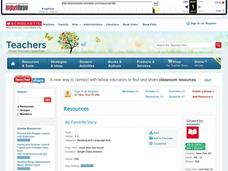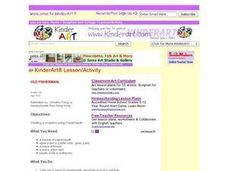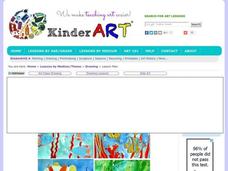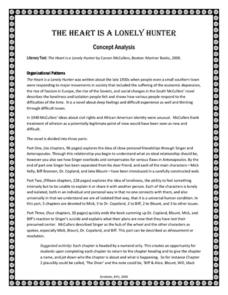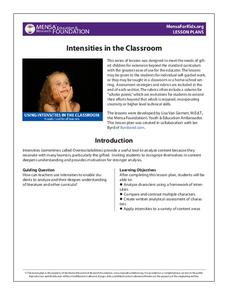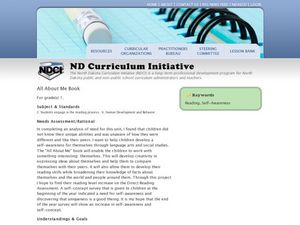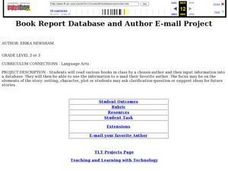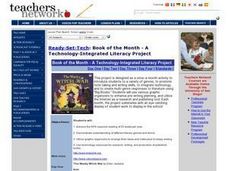Curated OER
Pudd'nhead Wilson: Concept Analysis
Learn all about the book Pudd'nhead Wilson with this analysis of the text. You can plan your unit with the useful teacher information provided here and use the project ideas to enrich instruction.
Curated OER
Halloween Literature Unit: Creative Writing Project
Students practice their creative writing skills and build cooperative learning skills. In this creative writing project, students review parts of a story. Students reinforce the concept of sequencing and develop stronger writing...
Curated OER
End of the Year Photography Project
An end of the year photography project can be a great way to produce a class photo album.
Curated OER
Making a Non-Fiction Big Book
Writing a non-fiction big book can help students learn about research techniques, note taking, and other skills.
Curated OER
The Cay- Book Questions
In this literature instructional activity, 5th graders answer 18 questions based upon the book The Cay. There are five open-ended extension prompts as well, such as making a map of the cay.
Curated OER
Book Discussions via Web 2.0
Students discuss books they read via web 2.0. and create a wiki and podcast that will present the audience with their select a book by a popular teen author and write a short script about the book. Students and type the critic of...
Curated OER
My Favorite Story
Students discuss their favorite book. In this book discussion lesson plan, students name the title and tell what makes the book special. Students also review the setting, plot, conflict, and resolution. Students make a book that tells...
Curated OER
Old Fisherman
Sculpting is a lot of fun and it stimulates multiple senses at once. Learners observe and then create a fisherman (or any person) out of paper clay. They mold and sculpt their clay until they have shaped a person. They then paint and...
PBS
Cardboard History
A PBS clip focused on collecting sports memorabilia launches this research project lesson. Class members then read Dan Gutman’s Honus and Me in which Wagner’s baseball card is used to time travel. The lesson ends with researchers...
Curated OER
Under the Sea
Tropical fish are a great subject for any art project, they are colorful, interesting, and can go along with under water themed stories read in class, learner written narratives, or Marine Biology units. This set of instructions will...
Curated OER
What Makes the Writer Write
Your 11th and 12th graders are ready to critique society! Channel that inclination by studying a novel that offers social criticism of other eras (book recommendations included). This resource presents a well-thought-out overview of such...
Curated OER
Character Tea Party
A tea party in Wonderland? An East Egg brunch with Gatsby, Daisy, Tom, and Nick? Breakfast with Miss Havisham, Lady Macbeth, and Abigail Williams? Or dinner with Andre, Hamlet, and Randle Patrick McMurphy? Class members select a favorite...
Captain Planet Foundation
Rotting Away
What happens at the end of a plant's life cycle? Show kids the natural way that plants show that they're decomposing, as well as the importance of compost, with a lesson about living organisms. After reading Log Cabin by Anne Schreiber,...
Novelinks
The Heart Is a Lonely Hunter: Concept Analysis
Considering Carson McCullers' The Heart Is a Lonely Hunter for whole-class reading or as a selection for book circles? Check out this resource that overviews the organizational patterns, themes, plot structure, tone, and setting.
MENSA Education & Research Foundation
Intensities in the Classroom
Everyone learns and experiences life differently. A set of lessons about character intensities encourages middle and high schoolers to analyze themselves, their peers, and characters from a book based on the five listed intensities:...
Curated OER
No Impact Project: Water
Students use the "No Impact Project" to analyze the consumption of water. In this water consumption lesson, students discuss the pros and cons of tap water or bottled water. Students read about chemicals in water and watch a video clip...
Curated OER
Free Reading Project
Pupils participate in a free reading project to improve their reading skills. In this reading project instructional activity, students spend 30 minutes reading each day and complete journal entries for the instructional activity. Pupils...
Curated OER
All About Me Book
First graders create a book about themselves and their world. In this All About Me book lesson plan, 1st graders complete prewriting activities, along with sharing their books with others.
Curated OER
"We Remember" Eulogy Project
Eighth graders complete a culminating project on the Holocaust. In this eulogy instructional activity, 8th graders use information gathered from previous research and create a poster about the Holocaust. Students make a presentation...
Curated OER
End of the School Year: It's Been a Great Year
Young scholars write about their school year and reflect on the goals they have accomplished. For this writing lesson plan, students use their writing skills, draw pictures, take pictures, and chart paper to complete this project.
Curated OER
Book Report Database and Author E-mail Project
Students read a number of books by a given author and input information into a database. They e-mail information about their favorite author to other students. They focus on story elements and ask questions or make suggestions for future...
Curated OER
Book of the Month - A Technology-Integrated Literacy Project
Students write a paragraph predicting what the book is about after viewing the front cover. They are given a copy of the Story Parts Maps, students are explained each story part. Students are explained that they most take notes on the...
Curated OER
Short Story Group PowerPoint Project
Students choose a short story from the class literature book. They find information about the author. They read the short story from the literature textbook. They create a PowerPoint to retell the short story.
Curated OER
Book: Spain
Students, after reading Chapter One in the book, "Spain," design and re-create the political boundaries as well as the physical features of nation of Spain. They utilize play-doh or salt dough to illustrate and create their three...








